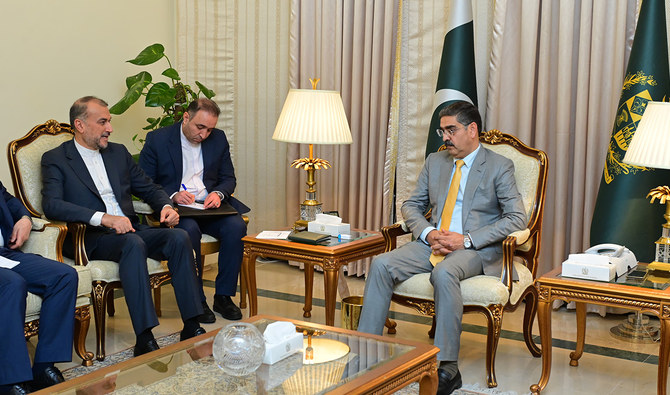Foreign Minister of Iran, Honourable Hossein Amir-Abdollahian has recent paid an official trip to Pakistan. The extraordinary visit of the Iranian Foreign Minister to Islamabad owes tremendous importance in the backdrop of the recent border clashes and diplomatic uproar between the two neighbors. The Iranian foreign Minister held brief talks with his Pakistani counterpart Syed Jalil Abbas Jilani, and also met Prime Minister Anwar-ul-Kakar, and Army Chief General Syed Asim Munir at Army Headquarters in Rawalpindi. According to the details, a wide array of bilateral relations including the border situation and the recent unfortunate incidents were briefly discussed during the first-ever high-level interactions in the post-conflict scenario between the two brotherly Muslim states.
In fact, the emergency diplomatic voyage of the Iranian chief diplomat effectively bridged the gap and reunited both nations reiterating their resolve to expand their cooperation, especially in the political and security domains. Both sides agreed to adopt collective and collaborative approaches to confront the menace of transnational terrorism by fully leveraging the robust institutional mechanism that already exists between their countries. The top leadership of Iran and Pakistan agreed to establish a high-level consultative mechanism at the level of the foreign ministers which will meet alternatively in both Iran and Pakistan regularly to oversee the progress that is being made in various areas of bilateral cooperation and teamwork. Both countries vowed to cooperate to fight terrorism in their respective areas while liaison officers would be appointed in each other country for effective coordination against the collective enemies.
Pakistan and Iran are two brotherly Muslim nations that are linked with multiple bonds of religion, shared culture, language, history, religious heritage, and geographical association. The two countries have ever enjoyed great cultural, geographical, and historical commonalities throughout the past. Both countries significantly boosted their trade and security cooperation by constituting a bilateral border management mechanism along with setting up various border markets to curb smuggling, promote trade activities, and increase livelihoods in border regions. Unfortunately, the Pak-Iran border region had always been a point of concern between the two neighbors due to the illegal movement of miscreants, transnational criminal gangs, and smugglers. Baloch ethnic insurgent groups the Baloch Liberation Army (BLA) and Baloch Liberation Front (BLF) have sanctuaries on the other side of the border that are often used by the anti-state elements to attack Pakistan, while the Iranian Sitsan-based Jaish Al-Adel often crossed joint border to hide inside Pakistan.
Historically, foreign-funded terrorist groups and transnational criminal gangs are the major threat to Pakistan-Iran ties, peace, and stability in that region. Both countries are well aware of the foreign powers who substantially fund and sponsor those terror groups. Indian Intelligence Agency coordinates with Baloch insurgents through the Indian Embassy in Tehran and Consulate General in Zaydan, while Western Intelligence Agencies use their diplomatic missions to support Jaish Al-Adel for the said job from Pakistan and Afghanistan. Transnational terrorism is a real risk which merits coordinated efforts, teamwork, and cooperation from both effectees nations.
The leadership from both countries has displayed the utmost resilience, brotherliness, and sagacity in dealing with the recent border clashes to undermine their bilateral fraternal ties. The two sides had a consensus that terrorism was a common threat that needed to be tackled through collaborative efforts, better coordination, and intelligence sharing, agreeing to use collective wisdom and joint resources to overcome this challenge. It is of utmost importance that both countries use this opportunity in their best national interests and eradicate the menace of terrorism from their soils permanently to provide a peaceful, secure, and healthy living environment to the people of the region.







